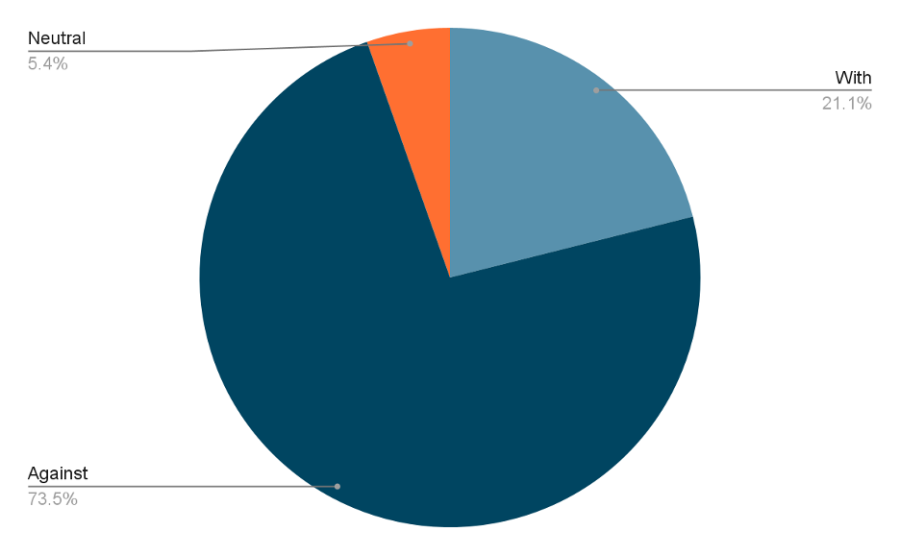
Case Study No.10: LBCI TV Channel Attacked Following the Broadcasting of a Sarcastic Video by Dayekh and Kaouk
The Samir Kassir Foundation (SKF) conducts a monthly selection of one case of violations against freedom of expression in Lebanon. We then analyze the reaction garnered on our own social media accounts. The objective is to gain insights into the perception of our social media audience towards our reporting and evaluate the overall level of support for freedom of expression in Lebanon.
Our study employs a framework that investigates the position of social media contributors towards the victim of the violation, the presence of hate speech, the visible political affiliation of the audience members, and also explores a gender perspective, when applicable.
In January 2023, SKF covered the attack on the headquarters of LBCI TV channel. This attack was preceded by a wave of violence incitement on social media by viewers who found a sketch offensive, particularly due to its derogatory reference to sacred religious figures of the Shiite community. Two actors, Mohammad Dayekh and Hussein Kaouk, had previously faced similar backlash for publishing sarcastic sketches on their social media platforms, touching upon sensitive topics for the Shiite community’s support base of the Amal Movement and Hezbollah. As a result, they were bombarded with spam calls and social media harassment. However, the severity escalated when LBCI decided to air a show directed by Dayekh and a team that included Kaouk and other members, following the duo’s decision to sever ties with Al Jadeed station.
On January 22, SKF’s SKeyes Center for Media and Cultural Freedom published a post on its Facebook account. This report examines the most relevant comments received on the post during the weeks following its publication. The results of the analysis are presented below.

Fig.1 - Position towards the victim of the violation
Upon analyzing 223 accounts, the findings revealed that 73.5% (164) of them did not support the narrative presenting the TV station as a victim of the violation. Whereas 21.1% (47) of the accounts condemned the acts of violence, with many expressing the view that targeting the actors was irrational, while the sectarian leaders—who, in their opinion, are the primary contributors to the Lebanese people’s difficulties—remained untouched. The remaining 5.4% (12) maintained a neutral stance.
.png)
Fig.2 - Use of hate speech
Among the 223 analyzed accounts, 15.7% (35) included comments that contained hate speech, whereas 84.3% (188) contributed comments that were free from hate speech.
.png)
Fig.3 - Commenters’ visible political affiliation
Among the 223 analyzed accounts, 21.4% (48) were found to have affiliations with Hezbollah, while 4.5% (10) showed affiliations with the Amal Movement. It is worth noting that 37.1% (13) of the accounts that used hate speech in their comments were affiliated with the Amal Movement and Hezbollah. This highlights an ongoing pattern from SKF’s previous reports that highlights the frequent use of hate speech by commenters’ affiliated with the aforementioned parties. The remaining accounts that used hate speech (22) did not display any obvious political affiliations.
Additionally, 1.3% (3) of the accounts were affiliated with the Free Patriotic Movement, and 0.9% (2) were associated with the Syrian Social Nationalist Party. Only one user from each of these parties opposed portraying the TV channel as a victim. Meanwhile, 1.8% (4) showed affiliation with the Future Movement, and 0.9% (2) leaned towards the Lebanese Forces. These accounts either took a sympathetic stance towards the TV station and expressed disappointment with the misleading campaigns launched by pro-Hezbollah users, or they chose to remain neutral on the specific details of the topic while expressing frustration with the overall situation.
The remaining 69.2% (155) of the accounts did not exhibit clear political affiliations. However, a significant portion of this category (105 accounts; 67.7%) posted comments against the victim. Most of these accounts echoed the discourse used by Hezbollah and Amal Movement-leaning users. Meanwhile, 40 of these accounts condemned the violence, and 10 accounts remained neutral.
.png)
Fig.4 - Commenters’ visible gender
Out of the 223 analyzed accounts, 61.9% (138) were males, and 38.1% (85) were females. It was observed that 74.28% (26) of the accounts that posted comments containing hate speech belonged to male contributors, whereas 25.71% (9) were associated with female accounts.
This report was made possible through support from the UN Democracy Fund..png)